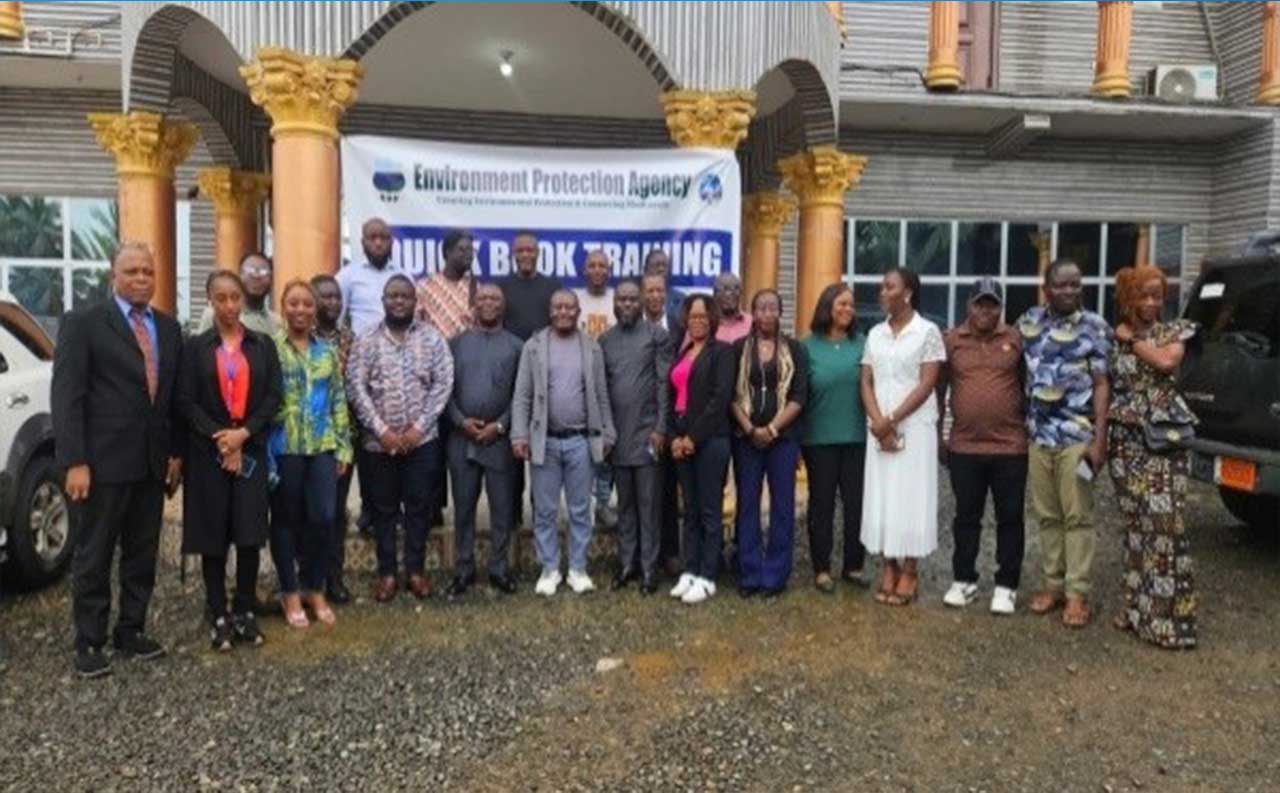The Environmental Protection Agency (EPA) of Liberia, with support from the Enhancing Climate Information Systems for Resilient Development Project (CIS), has opened a four-day QuickBooks training workshop in Kakata, Margibi County. The training is designed to strengthen the financial management capacity of the CIS Project finance team, the EPA finance department, the Audit Department, and implementing partners.
The four-day workshop, which runs from September 15-18, 2025, will feature facilitator-led sessions, live demonstrations, case studies, and practical QuickBooks exercises. Furthermore, Participants are expected to leave the training with enhanced financial reporting skills, better audit readiness, and improved collaboration across EPA departments and project teams.
According to a press release dated September 15,2025, the training is being held at the Cyntheo House in Kakata, and brings together 35 participants from the EPA and associated projects, including the Monrovia Metropolitan Climate Resilience Project (MMCRP) and the Sinoe Project.
Delivering the official opening statement on behalf of EPA Executive Director, Dr. Emmanuel King Urey Yarkpawolo, the Agency’s Acting Deputy Executive Director, Anthony S. Kollie, described the initiative as critical for improving institutional efficiency and accountability. He paid tribute to the dedication of the EPA team, noting their tireless work in safeguarding the environment while embracing innovation in financial management.
Kollie explained that QuickBooks Online would transform how the Agency and its projects manage financial resources by making operations faster, more transparent, and better aligned with both national and donor requirements. According to him, the software allows teams to access financial data from any device with internet connectivity, making it ideal for EPA staff working remotely or in the field while enabling seamless collaboration with accountants.
He noted that QuickBooks also automates income, expenses, inventory, and cash flow, reducing the risk of errors. He said they will ensure that reconciliations are always up to date, which provides accurate oversight of financial transactions.
The Acting Deputy Executive Director further highlighted the software’s invoicing and payment features, which allow staff to create and track professional invoices, accept payments through PayPal or bank cards, and even set recurring billing schedules that improve cash flow visibility.
He emphasized that QuickBooks also provides robust reporting and decision-making tools, giving managers the ability to generate customizable reports, profit and loss statements, and forecasts that can guide budgeting decisions and help identify cost-saving measures. According to him, the software integrates payroll and tax compliance functions, automating processes that reduce errors and prevent penalties, an essential advantage for growing institutions like the EPA.
He stressed that QuickBooks offers bank-level data security and automatic backups, providing staff with peace of mind. He also pointed out that the platform is user-friendly and scalable, with built-in templates that make it easy even for non-accountants to manage financial transactions. “In essence, QuickBooks Online transforms complex financial management into a streamlined, online powerhouse that eases administrative loads and fuels mission-driven growth, ideal for modern, digital EPA operations,” Mr. Kollie concluded, before officially declaring the training opened on behalf of the Executive Director and the entire Agency.
For his part, EPA Controller, Fred Dehfer, urged colleagues to take the training seriously, recalling that while the EPA had previously used QuickBooks, its application slowed due to challenges.
He expressed optimism that this renewed training would allow the Agency to maximize the system for more effective financial operations. Also speaking, Nelson S. Jallah, Project Manager of the CIS Project, highlighted the broader objective of the initiative. He explained that the CIS Project, funded by the Green Climate Fund, the African Development Bank, and the Government of Liberia, is a flagship program aimed at enhancing climate data systems, strengthening national resilience, and promoting accountability in managing climate resources.
“As part of our commitment to accountability and transparency, the CIS Project is investing in capacity-building for financial teams. He said the QuickBooks is globally recognized for improving accuracy in financial management, facilitating transparent reporting, and ensuring compliance with donor and national requirements. Through this training, “We aim to harmonize financial practices across EPA projects and empower staff with tools that improve efficiency and audit readiness,” Jallah added.



